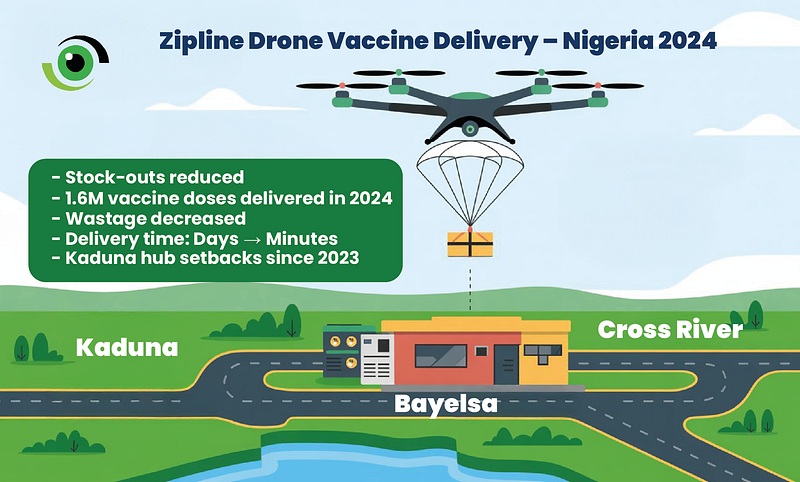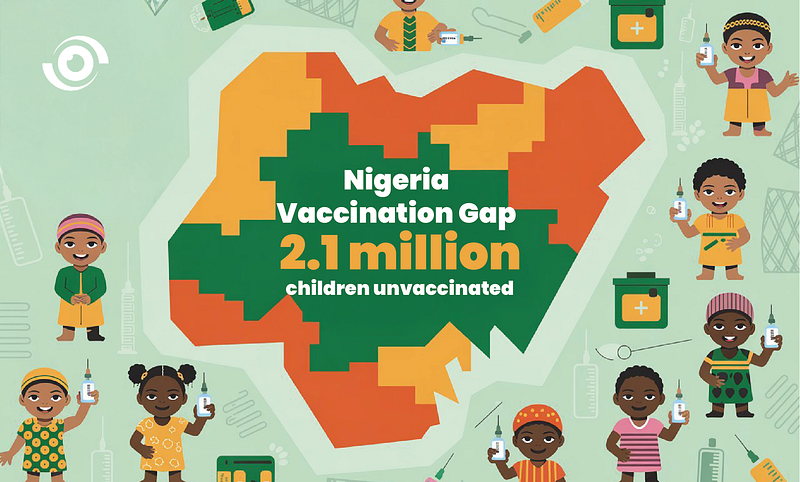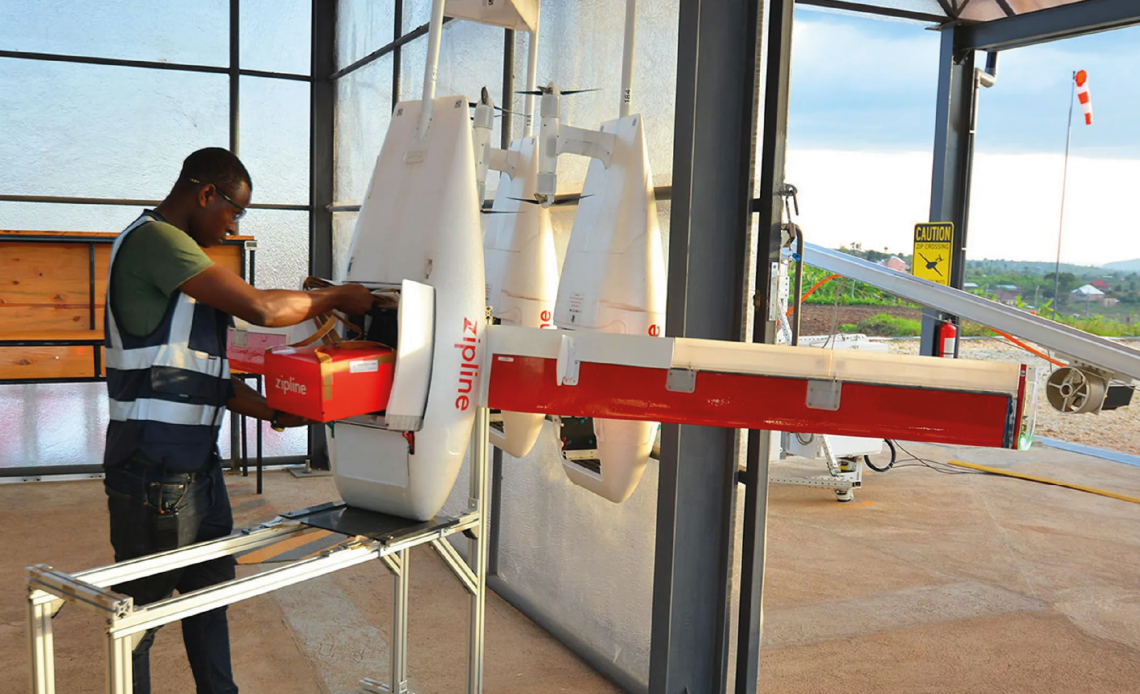Habibat Ohunene Lawal and Sunday Oko (Lead writers)
In global health security, speed can determine whether lives are saved or lost. From transporting blood to a mother in critical condition to delivering vaccines during an outbreak, timely access to essential medical supplies is non-negotiable.
Around the world, innovations in health logistics are shaping what is possible. Zipline’s autonomous drone delivery system is one such breakthrough, expanding access to care particularly in hard-to-reach areas where traditional infrastructure is failing.
The U.S.-based logistics company has pioneered the use of a network of autonomous drones to deliver vital medical supplies, cutting through bottlenecks such as poor roads and traffic. Leveraging innovation, Zipline bypasses the traditional bottlenecks of infrastructure, traffic, and geographical barriers, creating an instant logistics network. In 2022, the Kaduna State government invited Zipline to establish a distribution centre in Pambegua, a community within the state. This represented an important step toward strengthening the state’s health supply chain and improving access for hard-to-reach communities.

Prior to Zipline’s arrival, accessing essential routine vaccines in underserved communities across Kaduna State was a significant logistical challenge. According to Mallam Hussein, the Cold Chain Officer for Kauru Local Government Area (LGA), “some remote health facilities such as Galadimawa PHC, Kono PHC, Geshere PHC, and Ibada PHC were almost perpetually stocked out of core vaccines. Distributing vaccines to these areas was exceedingly difficult due to poor, often impassable road networks, which deteriorated further during the rainy season.”
Between August 2022 and March 2023, Zipline Kaduna helped bridge this gap, delivering more than 225,000 vaccines, including 154,000 COVID‑19 doses, blood products and emergency medicines.
“Zipline has transformed public health in Kaduna, just as it did in Ghana,” Dr. Amina Mohammed-Baloni, Kaduna State’s previous Commissioner of Health who championed the partnership, stated. “It’s not about drones; it’s about equity, ensuring all children, regardless of their location, have access to life-saving vaccines and intelligent use of resources.”

However, Zipline’s operations in Kaduna are currently on hold following changes in political leadership and subsequent shifts in administrative priorities. While such pauses are common as new administrations review existing commitments, the situation highlights a critical vulnerability, even the most impactful innovations can be stalled without sustained political will.
While Zipline’s model demonstrated that drones can reduce stock‑outs, minimise wastage, and extend care to the hardest‑to‑reach Nigerians, it has not yet shown that these gains can withstand political transitions.
Nigeria’s cold chain crisis
Maintaining an unbroken cold chain is essential to preserving vaccine efficacy. Yet, in many settings, vaccines, especially those requiring ultra-low temperatures, are frequently compromised during transport in poorly equipped vehicles or lost to extended power outages at health facilities. The result is not only reduced potency, but also significant wastage, with countless doses discarded before they can reach the peoole who need them. Strengthening cold chain systems through innovations such as solar-powered refrigeration and drone delivery can ensure that every dose counts, safeguarding both resources and lives.
Beyond these logistical barriers, the supply chain itself was faced with systemic inefficiencies. In a bid to avoid immediate stock-outs, health facilities often ordered more vaccines than they could realistically use before expiry. Combined with unpredictable demand and the absence of real-time inventory tracking, this led to large volumes of expired vaccines being discarded as a matter of routine. The result was a deeply inefficient cycle, some facilities faced critical shortages, while others wasted valuable doses.
At the periphery, these gaps pushed Kaduna’s population of zero-dose children -those who had never received even a single vaccine, further into vulnerability. During public health emergencies, such as disease outbreaks, the sluggishness of traditional logistics severely hampered rapid response efforts, leaving entire communities exposed. The human toll was undeniable, anxious parents, overwhelmed health workers, and preventable illnesses claiming lives that could and should have been saved. This is precisely where innovations like Zipline demonstrated their value, offering a faster, more reliable way to close critical gaps in the supply chain.

Lessons to Learn
Kaduna’s pause on drone deliveries should not be interpreted as a failure, but rather as a necessary stress test for scaling innovation. Pilots, no matter how promising, require deliberate strategy to evolve into sustainable national services.
To truly embed aerial logistics within Nigeria’s health system, four critical shifts.
– (1) Drone delivery must be institutionalised within national policy frameworks and planning frameworks such as the National Vaccine Policy and integrating aerial logistics as a standard “last mile” delivery option in the forthcoming Supply Chain Transformation Roadmap. Establishing clear Standard Operating Procedures (SOPs) is vital in covering everything from licensing requirements and safety protocols to environmental standards and data governance. Without a formal policy foundation, drone risk remaining an ad-hoc solution instead of a reliable component of the healthcare supply chain.
– (2) Secure long-term financing mechanisms. Federal and state governments should create dedicated budget lines for aerial logistics, benchmarked against the comparative costs of road transport, vaccine wastage, and penalties for stock-outs. Public-private partnerships (PPPs) should reward delivery reliability through performance-based payments, insulated from political cycles. Development finance institutions can de-risk early investments, while future savings from reduced wastage and improved efficiency can fund recurrent costs, making the model self-sustaining over time.
– (3) Digitise the entire ordering ecosystem to support timely and efficient drone operations. This requires expanding electronic Logistics Management Information Systems (eLMIS) to every primary healthcare facility. This will ensure demand signals are accurate and timely. Integrating drone delivery Application Programming Interface (APIs) into Nigeria’s Health Commodities Management Platform will enable automatic routing of urgent or high-priority orders, reducing delays and boosting responsiveness during public health emergencies.
– (4) Expand the use cases. The same drone corridors can ferry antivenoms to snakebite belts, oxytocin to maternity wards, or lab samples to Polymerase Chain Reaction (PCR) centres. In floods or other climate-related disasters like landslides when roads are cut off, a network of skyways becomes lifelines. As Nigeria decentralises primary healthcare, aerial logistics can help connect a fragmented system.
If Nigeria takes these steps, it can build a resilient and sustainable future-ready healthcare logistics structure, ensuring that every dose counts, and every life has a fighting chance, regardless of geography or the winds of political change.



1 Comment